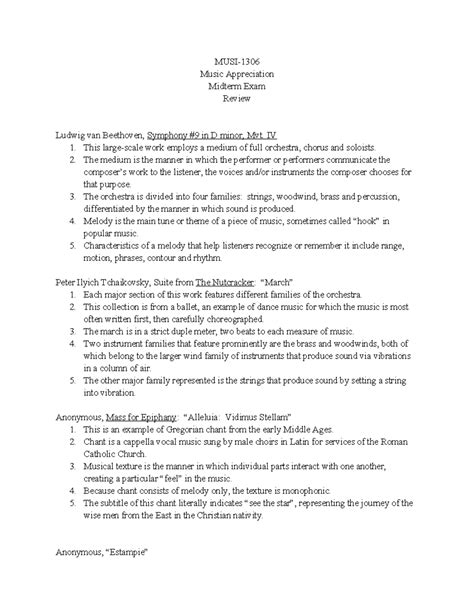Introduction
Music appreciation is a profound art form that transcends cultural boundaries, captivating the hearts and minds of individuals worldwide. It encompasses a vast spectrum of genres, each with its unique characteristics and emotional resonance. The study of music appreciation not only enhances our enjoyment of music but also cultivates our critical thinking skills, emotional intelligence, and cultural awareness. This article aims to provide a comprehensive guide to music appreciation, empowering you to unlock the rich tapestry of musical experiences for your upcoming midterm examination.

Understanding the Elements of Music
The foundation of music appreciation lies in understanding the fundamental elements that make up this captivating art form. These elements include:
Rhythm and Meter
- Rhythm refers to the pattern of beats and accents, creating the temporal structure of music.
- Meter organizes rhythm into regular groupings, known as measures or bars.
Melody and Harmony
- Melody is a series of single notes that flow in succession, creating memorable and emotionally evocative tunes.
- Harmony is the combination of notes played simultaneously, creating a rich and complex soundscape.
Instrumentation and Texture
- Instrumentation refers to the specific instruments used to create the music, each with its unique timbre and sonic qualities.
- Texture describes the overall density and complexity of a musical work, ranging from simple melodies to intricate polyphonies.
Form and Structure
- Form refers to the overall shape and organization of a musical piece, consisting of sections such as introductions, verses, choruses, and bridges.
- Structure provides a sense of order and predictability, helping listeners comprehend and appreciate the music’s journey.
Exploring Music History and Genres
Music appreciation is enriched by an understanding of the historical and cultural context of different musical genres. Major periods of music history include:
Medieval and Renaissance Music (c. 500-1600)
- Focused on religious music, with Gregorian chant and polyphonic choral works.
Baroque Music (c. 1600-1750)
- Characterized by elaborate melodies, ornamentation, and the use of continuo.
Classical Music (c. 1750-1820)
- Emphasized balance, clarity, and emotional expression, with composers such as Mozart and Beethoven.
Romantic Music (c. 1820-1900)
- Explored emotional depth, grand gestures, and programmatic compositions.
20th-Century Music
- Embraced atonality, serialism, and electronic music, with pioneers such as Stravinsky and Schoenberg.
Listening to Music with Intent
Active listening is crucial to fully appreciate music. Engage your senses and focus on the following aspects:
Pay Attention to Details
- Identify the instruments, rhythms, and melodies that make up the piece.
- Notice the changes in dynamics, tempo, and orchestration.
Consider the Emotional Impact
- How does the music make you feel?
- What emotions does it evoke through its rhythms, harmonies, and melodies?
Analyze the Structure
- Identify the different sections of the piece and how they fit together.
- Understand the use of repetition, contrast, and variation.
Form Connections
- Connect the music to your personal experiences, memories, or cultural background.
- Explore how it relates to other works of art or literature.
Common Mistakes to Avoid
To enhance your music appreciation experience, avoid common pitfalls such as:
Passive Listening
- Engage fully with the music by actively listening and paying attention to its details.
Focusing on Technical Aspects
- While technical understanding is important, don’t become so engrossed in the mechanics that you lose sight of the emotional and expressive qualities of the music.
Limiting Yourself to One Genre
- Explore a variety of musical genres to broaden your musical horizons and appreciate the diversity of artistic expression.
Relying on Subjective Opinions
- Form your own informed opinions based on your understanding of the music’s elements and context.
- Be open to different interpretations and perspectives.
Preparing for the Midterm Exam
To excel in your music appreciation midterm exam, consider the following strategies:
Know the Core Concepts
- Review the elements of music, music history, and listening techniques.
- Comprehend the key concepts and terminology associated with music appreciation.
Study the Required Materials
- Thoroughly read the assigned readings, listen to the designated musical examples, and attend all class sessions.
- Take notes and highlight important passages for future reference.
Practice Active Listening
- Engage in active listening exercises, focusing on the musical elements and emotional impact.
- Attend concerts or listen to recordings to deepen your understanding of the music.
Seek Clarification and Support
- Reach out to your professor or teaching assistant with any questions or concerns.
- Join study groups or participate in online forums to collaborate with peers.
Review and Rehearse
- Regularly review your notes and listen to the required musical examples.
- Simulate the exam environment by taking practice quizzes or mock exams.
Conclusion
Music appreciation is a transformative journey that unlocks a world of artistic experiences, cultural understanding, and emotional growth. By embracing the elements of music, exploring its history and genres, and actively engaging in the listening process, you can cultivate a deep and meaningful appreciation for this universal art form. Remember to avoid common pitfalls, prepare thoroughly for your midterm exam, and immerse yourself in the symphony of sound. May your midterm examination be a testament to your passion for music and your ability to connect with the transformative power it holds.
